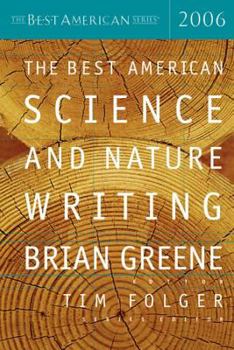The Best American Science and Nature Writing 2006
(Book #2006 in the Best American Science and Nature Writing Series)
Select Format
Select Condition 
Book Overview
In his introduction to The Best American Science and Nature Writing 2006, Brian Greene writes that science needs to be recognized for what it is: the ultimate in adventure stories.
Format:Paperback
Language:English
ISBN:061872222X
ISBN13:9780618722228
Release Date:October 2006
Publisher:Houghton Mifflin
Length:320 Pages
Weight:0.75 lbs.
Dimensions:0.9" x 5.5" x 8.4"
Customer Reviews
4 ratings
another winner
Published by Thriftbooks.com User , 17 years ago
I read the best american series every year, in fact, with science and nature writing, I've been with since the beginning. And you can always count on BASNW to be good. It's always at the layman's level, so it can be understood and it is a great way for us nonacademics and nonscientist to keep up with the latest advances in science and technology. This year's edition is edited by physicist Brian Greene, which almost worried me, because I prefer life and earth science essays over the harder sciences and technology. But Greene is a popular science writer and he collects a great group of essays, few of which covered his area of expertise.
Excellent collection.
Published by Thriftbooks.com User , 17 years ago
This was given to me as a gift and I kept coming back to it. It includes so many different fields, authors and styles of writing that you can't get bored. Almost every essay is excellent, and if you get tired of one the next one will be amazing. One minute it's string theory and the next it's linguistics and the next biology. It's hard to keep up with all that's going on in the science community but this is a great way to hear some of the stories and learn about a broad range of great science. Thoughtful but hardly too technical. I liked this collection so much that I bought the 2005 and 2004 collections. 2005 was not as interesting to me, a lot more focused on policy and less thrilling as a whole, though some gems in there. 2004 was somewhere between the quality of 2006 and 2005. A different guest editor each year... looking forward to the next one. Gave 2006 to a friend as a must-read. The most interesting work I've read in some time. Thanks Mr Green and the many authors.
The amazing things we don't (but should) know about our world
Published by Thriftbooks.com User , 17 years ago
This is a series I particularly look forward to every year for the thought-provoking glimpses it provides into the role science and technology play in our daily lives and future prospects, from the downside of increasing longevity and the dangers of decreasing autopsies to the evolutionary role of swearing and the scary consequences of indiscriminate antibiotics use. John Hockenberry has a particularly fascinating piece on military blogs - how the immediacy of the technology affects our view of war and how little the brass knows about how to handle it. What makes this article so riveting is his ability to capture the diverse personalities and strong views of the bloggers and the technology's tantalizing implications for the future. There are portraits of quirky people doing unusual things, like Kevin Krajick's profile of Arthur Aufderheide who dissects mummies and preserves their tissues for research that can tell us much about how they lived. And Drake Bennett's visit with "Dr. Ecstasy," Alexander Shulgin, a man who has devoted his life to the study of hallucinogenics. The inventor of Ecstasy (among many other illegal substances), and a man of 4,000 psychedelic experiences, Shulgin was on the government payroll until he decided to publish a how-to book. The eloquent Oliver Sacks remembers DNA's Francis Crick and Crick's influence on his own career, and John Horgan profiles neuroscientist and brain chip pioneer Jose Delgado whose impressive achievements have been intentionally forgotten. Since Greene is a physicist ("The Elegant Universe") there are precise and elegant (that is, comprehensible) pieces on time travel (Dennis Overbye), gravity (Juan Maldacena) mass (Gordon Kane), and NASA's X-ray Observatory (Robert Kunzig). There are also articles on Earthquake prediction (Kevin Krajick), indigenous people displaced by conservationists (Mark Dowie), and animal deal making (Frans B.M. De Waal). One of the book's most moving and fascinating articles is Michael Chorost's essay on his cochlear implant and his pursuit of music. Mostly deaf from birth, he became profoundly deaf as an adult. While the implant allowed him to hear speech, his enjoyment of Ravel's "Bolero," had gone. Working to regain this pleasure he initiates us into mysteries of deafness, the technology of cochlear implants and the nature of music. Many pieces will spur readers to further reading, depending on their interests, and all are elegantly written and of wide appeal. If you read only one "Best of" book this year, make it this one. -- Portsmouth Herald
This popular science book will blow your mind!
Published by Thriftbooks.com User , 18 years ago
I was struck by something Brian Greene says in the intro to this enjoyable book: more or less, that it's generally acceptable for people with degrees in the humanities not to know anything about science; and that that's not good for us as a scientifically competitive country. My three favorite articles: "Dr. Ecstasy", "His Brain, Her Brain", and "Remembering Francis Crick", by Oliver Sacks. That last looks like a sedate title, but this coverage of the correspondence between Sacks and Crick, who discovered the double-helix of DNA, is not only a great adventure; but if you haven't read Oliver Sacks before, it is a good, broad overview of what his writing is about. I've read some Sacks books, but this made me want to read all the rest.





